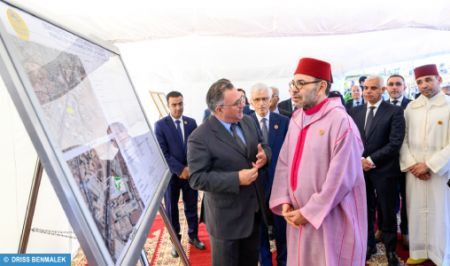
King Mohammed VI laid, on Tuesday, the foundation stone for a community medical center and launched the 2nd Stage of a connected mobile medical units program in Casablanca.
The two projects reflect the King’s commitment to strengthen the national healthcare system, improve medical services for citizens, consolidate community healthcare services, promote the access of populations, notably in rural areas, to quality basic health services and ensure periodic and regular medical monitoring for people whose health requires specialized consultations.
The Community Medical Center, located in Lissasfa district, requires a 90-million dirhams investment and is the 3rd of its kind in the Casablanca-Settat region, after those built in Sidi Moumen district and the new town of Errahma. The project is an integral part of an action plan led by the Mohammed V Foundation for Solidarity to support the national medical sector, particularly by reinforcing healthcare system in densely populated urban areas.
As an intermediary facility between the network of basic healthcare facilities (levels 1 and 2) and the hospital network, the future Center, which will provide services to some 60,000 people a year, will help alleviate pressure on existing hospital facilities in the region and avoid long-distance journeys to other facilities.
This Community Medical Center will be built within 24 months on an 11,170 m2 site (7,692 m2 covered), and will include units for outpatient consultations and functional explorations, functional rehabilitation, dental care, and community medical emergencies.
It will also include units for primary care, radiology, childbirth and sterilization, as well as a surgery room, a medical analysis laboratory, a hospitalization unit (13 double rooms), a pharmacy, and a kitchen.
Carried out thanks to a partnership between the Mohammed V Foundation for Solidarity and the Ministry of Health and Social Protection, this project is part of an overall program led by the Foundation that will eventually see the construction of twelve Community Medical Centers: three in Casablanca, two in Fez, two in Tangiers and one in each of Agadir, Marrakech, Rabat, Salé, and Temara.
During the foundation stone laying ceremony, the King followed explanations on the “Hospital Information System”, an integrated digital system, set up by the Ministry of Health and based on the concept of the patient’s file that brings together all his data: administrative data, medical file, and care records.
The system, available in both primary care and hospital facilities, is one of the pillars of the national healthcare system overhaul, and enables healthcare professionals to access patient medical data at any time, with the aim of speeding up medical treatment and improving efficiency.
As for the Connected Mobile Medical Unit program whose 2nd stage was launched this Tuesday by the King, it aims to improve rural populations’ access to high-quality medical services and represents a new intervention model that combines community care and telemedicine.
The first stage of this pilot program, launched by the Sovereign on October 28, 2023, was carried out in partnership between the Mohammed V Foundation for Solidarity, the Ministry of Health, and the service provider MEDIOT Technology.
The Connected Mobile Medical Unit Program – Mohammed V Foundation for Solidarity adopts a new qualitative approach aimed at integrating face-to-face general medicine consultations and remote specialized medicine consultations, to bring medical services closer to citizens.
Each connected mobile medical unit comprises a medical block consisting of two multi-purpose consultation and treatment cubicles, equipped with basic medical instruments, medical furniture, connectivity systems and a full range of latest-generation biomedical equipment, which serve as work tools for remote consultations.
Fifty new connected mobile medical units will be deployed under the second stage launched Tuesday.
The center is run by a dedicated team, including a general practitioner, two nurses and an administrative manager, who handle face-to-face general medical consultations, tele-expertise, outpatient care and public health program monitoring.
Resort to tele-expertise is the responsibility of the general practitioner who, when a case requires an opinion or assistance with examinations, calls on a specialist, depending on the specialty required (gynecology-obstetrics, pediatrics, endocrinology, dermatology, ENT, cardiology, pneumology and nephrology), who operates from a central telemedicine platform linked to all the connected mobile medical units.
Up to March 25, the fifty connected mobile medical units deployed in 34 provinces, across nine regions of the Kingdom, as part of the first stage had provided around 120,000 medical services, including more than 96,000 face-to-face general medicine consultations, around 12,000 remote specialized consultations and more than 7,000 nursing clinical examinations.
The King followed a simulation of a tele-expertise carried out by a general practitioner on site, in liaison with specialist doctors at the central telemedicine platform in Casablanca.
On this occasion, the Sovereign symbolically handed over three ambulances and five utility vehicles, donated by the Mohammed V Foundation for Solidarity, to representatives of the “Adassil”, “Talat N’Yacoub” and “Tizi N’Test” municipalities, which were affected by the earthquake of September 08, as well as five associations.
This is part of a donation of 46 vehicles for municipalities, associations, and cooperatives in different regions of the Kingdom.
